
Nearshoring and Mexico's regional attractiveness maintain forecasts of reaching 3% growth, according to the investment bank Barclays.
The American investment bank Barclays maintains its growth expectation for Mexico at 3% for this year.
“We are seeing a lot of investment from industrial parks and construction companies. It is evident that the government's infrastructure projects continue to advance and we have the United States growing in such a relevant way that it is very difficult to assume that it will not give a strong boost to Mexico," commented the chief economist for Latin America at Barclays, Gabriel Casillas. .
By incorporating these forces into the growth estimate for Mexico, it gives you 3% annually, he stressed.
Interviewed within the framework of his participation in the Spring Meetings of the International Monetary Fund (IMF), he clarified that if he had to revise his growth forecast for Mexico, it would be due to the completion of the government's infrastructure projects. Because the boost that nearshoring will give to the economy, which is estimated at 0.6 points of GDP for this year, is immovable.
INTERVIEW WITH GABRIEL CASILLAS
Here at the Fund they have made several recommendations to strengthen Mexico's attractiveness in the context of global fragmentation, what in Mexico we see as nearshoring . What happens if the presidential candidates do not take it into account?
- Whether we like it or not, with changes and strategies developed specifically or not, nearshoring will continue and reach Mexico.
- Experts from the Institute of International Finance (IIF) tell us that the opportunity to attract investments is not exclusive to Mexico and that there are more countries in the region that can take advantage of it.
- There is no country closer geographically and commercially to the United States. There is no other country in the region with the manufacturing vocation and experience that Mexico has. But what they are right about is that if Mexico develops a more investment-friendly strategy, a promotional effort, if it improves infrastructure, favors and stimulates the generation of green energy, it could attract many more investments. But even without doing so, they will continue to arrive.
THEY RESOLVE CASE BY CASE, WITHOUT A GENERAL STRATEGY
The expert, based in New York, says that investors in Paris, Japan and Boston are paying attention to the development of events in Mexico, related to the relocation of businesses and the strategy that the presidential candidates may develop.
They are attentive to the composition that Congress will have in the elections, because they like there to be balance, that no party has absolute power to make constitutional changes, he noted.
He commented that investors are already more accustomed to the current management of the López Obrador government. They do not have a national strategy to guarantee the supply of any resource. A problem arises in some entity, and they solve it. They go case by case. They do not promote, but if a company is interested in arriving, they support it. That is neither good nor bad in itself, and what is ultimately happening is that they resolve.
WAR CONFLICTS REINFORCE RELOCATION
Casillas trusted that the geopolitical conflicts that have been identified by the IMF as a risk to growth will not escalate.
Historically, when we see that countries with similar nuclear capabilities, they have veiled rivalries and do not make explicit attacks.
There may be an escalation that divides countries into poles, like the Cold War, and it will surely derail the globalization process, but we are not heading towards a Third World War or long-term conflict.
What it will continue to generate is a disruption of world trade that will feed the fragmentation that the IMF talks about, and will continue to promote nearshoring and friendshoring . And as the Fund's experts already said, this will continue to benefit Mexico and is the basis of the positive expectation for the Aztec country, although fiscal consolidation will come next year and take a little room for growth.
The expert is visiting Washington to participate in the IMF Spring Meetings and in the parallel events that are being held in the entity's various study and research centers.









